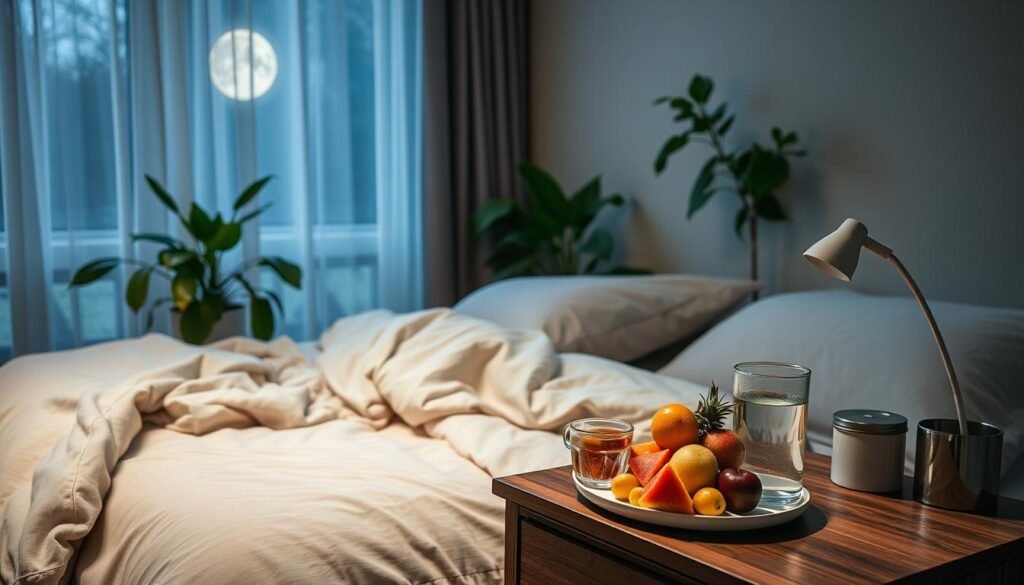Almost one-third of Americans sleep less than seven hours a night. This fact shows we need to understand how our daily choices affect our sleep. The rise of technology and changes in social behavior make this even more important. What we eat, how much we move, and how we deal with stress all play big roles.
It’s crucial to adopt healthy wellness practices for better sleep. Studies show eating more fiber leads to deeper sleep, whereas lots of saturated fat and sugar do the opposite. Also, exercising in the morning not only kick-starts your day but helps your sleep-wake cycle by getting you more sunlight. Understanding these points can really help improve how well you sleep.
This article will give more details on how different habits affect sleep. It’ll help you make changes for better sleep health.
Key Takeaways
- Almost one-third of Americans get less than seven hours of sleep each night.
- Eating more fiber is associated with deeper sleep, while saturated fat and sugar reduce sleep quality.
- Morning exercise can enhance the sleep-wake cycle.
- Healthy lifestyle choices are crucial for improving overall sleep health.
- Understanding lifestyle factors is vital for addressing sleep issues.
The Connection Between Lifestyle and Sleep Quality
Understanding how lifestyle choices impact sleep quality is key to better health. Nearly 50 to 70 million adults in the US struggle with sleep issues. This highlights the need for changes in our daily lives.
Sleep hygiene involves habits that help you sleep better regularly. A regular sleep schedule, less screen time at night, and a comfy sleeping area improve sleep quality. When sleep suffers, it can lead to unhealthy habits that make it even worse.
Studies show irregular social rhythms can hurt sleep health. Lots of screen time, including social media and TV, links to worse sleep. Good sleep hygiene leads to better sleep quality.
Regular exercise helps sleep too. Middle-aged adults who exercise sleep better than those who don’t. This shows how lifestyle choices and sleep quality are connected. For more information, visit this link.
Lifestyle Choices and Their Impact on Sleep Quality
The choices we make every day greatly affect our sleep. Choosing positive lifestyle changes can lead to better sleep habits. On the other hand, bad choices in diet, activity levels, and stress management can harm sleep quality. It’s vital to know how these factors are linked to improve our health.
The Role of Diet in Sleep Health
What we eat plays a big role in how well we sleep. Eating foods low in fiber and high in sugar can lead to poor sleep. It’s important to eat the right balance of carbs, proteins, and fats for good rest. Foods like cherries, kiwis, oily fish, and veggies are great for sleep.
Changing when and what you eat can also help you sleep better. Try not to eat heavy meals right before bed.
Impact of Physical Activity on Sleep Patterns
Being active is key to sleeping well. Exercise helps keep our sleep cycles regular. Studies show that working out, especially in the morning, can make sleep deeper.
This is because morning exercise fits our body’s natural rhythm and leads to healthier choices.
Effects of Stress Management on Sleep Quality
Handling stress properly can improve sleep. Techniques like meditation and deep breathing reduce stress, helping us sleep better. If we don’t manage stress, we might face insomnia. This highlights the need for habits that help us relax and stay mindful for better sleep.

| Lifestyle Factor | Positive Impact on Sleep | Negative Impact on Sleep |
|---|---|---|
| Diet | Fiber-rich foods, balanced meals | High sugar, low protein, irregular meals |
| Physical Activity | Regular exercise, morning workouts | Sedentary lifestyle, lack of engagement |
| Stress Management | Meditation, deep breathing | High stress, poor coping mechanisms |
Understanding Sleep Hygiene
Getting good sleep starts with proper sleep hygiene. Setting a consistent bedtime routine is key. It gets your mind and body ready to rest. This routine is also important for fighting sleep problems. By following good habits, you can improve your sleep hygiene. This helps with issues like trouble falling asleep and feeling tired during the day.
Importance of a Bedtime Routine
Having a clear bedtime routine greatly improves sleep quality. Keeping the same wake-up time helps establish a natural sleep rhythm. Doing things like dimming the lights and powering down electronics before bed can help increase melatonin levels. Also, calming activities before bed, like reading or meditating, aid in falling asleep more easily.
Creating a Sleep-Friendly Environment
Your sleep space plays a big role in how well you sleep. Comfortable mattresses, ideal room temperature, and quiet surroundings matter a lot. Making the room quieter and adjusting the temperature can help make your bedroom a better place for sleep. For some, adding soothing scents like lavender makes it easier to unwind before sleep. A well-set-up sleep environment increases the odds of good rest.
Healthy Habits for Better Sleep
Healthy habits are key to better sleep. Eating wisely and living well makes a big difference. It’s important to manage what you eat during the day and not snack too much at night. Doing these things helps you sleep more soundly.
Balancing Calories Throughout the Day
Eating balanced meals helps with sleeping well. Eating regularly prevents hunger at night and keeps you from eating too much before bed. Eating lots of fruits, veggies, and grains improves sleep. This diet balances energy and cuts down sleep problems.
Avoiding Late-Night Snacking
Snacking late at night can ruin good sleep. Eating a lot before bed makes it hard to fall asleep and stay asleep. Choose light, easy snacks like yogurt or fruit instead. This change will help you have a better night’s sleep.
Learn more about natural ways to sleep better by visiting natural sleep aids and remedies.

Dietary Factors That Disrupt Sleep
What we eat deeply affects how well we sleep. Certain foods and eating habits might disrupt our sleep. It’s vital to know which foods to avoid and include fiber-rich options for better sleep.
Foods to Avoid for Quality Sleep
To sleep better, be careful with certain foods. Here’s what to watch out for:
- Avoid caffeine-rich drinks like coffee, tea, and energy drinks in the afternoon. They can keep you awake.
- Greasy foods and heavy meats may disturb your sleep by causing stomach issues.
- Sweet snacks lead to energy surges and drops, which can wreck your sleep cycle.
- Spicy and acidic foods might give you heartburn at night, interrupting your rest.
- Alcohol may help you fall asleep, but it ultimately ruins sleep quality if you drink it before bed.
Benefits of Fiber-Rich Foods
Adding foods rich in fiber to your diet helps enhance sleep. Here are their benefits:
- Eating high-fiber foods aids in keeping a healthy weight. This reduces sleep apnea and snoring.
- These foods prevent blood sugar spikes, ensuring more consistent energy and better sleep.
- Fiber-rich diets increase serotonin, key for sleep cycle regulation.
- Foods high in fiber also have melatonin and other nutrients, improving sleep quality.
- Fiber reduces the hunger hormone ghrelin, decreasing late-night snacks that could interrupt sleep.

The Effects of Technology on Sleep
Modern technology greatly influences our daily lives, including our sleep. Many people use their screens well into the night. This habit can lead to trouble sleeping and changes in sleep cycles. Surveys found that 28% of people say they’ve had bad sleep in the past month. Some even wake up at night to check their phones.
The Impact of Screen Time Before Bed
Spending too much time on phones and tablets can cause sleep problems. These devices make it harder for us to fall asleep, known as sleep latency. Users of these gadgets are nearly two times more likely to have this issue. Also, 95.1% have their phones nearby when sleeping. Additionally, 70% check social media in bed, which can lead to insomnia and less sleep.
Possible Solutions for Reducing Technology Use
There are ways to lessen the negative impact of tech on sleep. Setting a *technology curfew* can help avoid screens before bedtime. Instead, try tech-free activities like reading or writing in a journal. These can help you wind down. It’s also good to avoid social media before bed to improve sleep.
Adding these habits to your evening can improve your sleep quality. Practices like mindfulness meditation can also lower stress, helping you sleep better. By following these tips, you can enjoy a deeper, more healing rest. To learn more about setting up a bedtime routine, check out this resource.
Sleep Patterns and Physical Activity
The link between sleep and exercise is complex but vital for well-being. Being active regularly improves sleep quality significantly. This leads to more restful nights and better recovery. Studies show that those who exercise regularly sleep more consistently. They find it easier to fall asleep and stay asleep throughout the night.
In contrast, not being active can disrupt a regular sleep schedule. This fact stresses the importance of making lifestyle choices that encourage being active. A study with 82 participants over a few months found interesting results. It showed that being less sedentary and more active improves sleep quality.
Increased exercise is linked to longer deep sleep and shorter REM sleep phases. More sitting time, however, results in less deep sleep. This data suggests that moderate exercise boosts energy and lowers stress, creating better sleep conditions.
There’s also a two-way relationship between sleep and exercise. Poor sleep can make you less active the next day. On the flip side, improving one can boost the other. A good workout can enhance sleep, making it easier to fall asleep and reducing nighttime wake-ups. Tailoring your exercise schedule to fit your sleep pattern can be very effective. Even those who exercise late might fall asleep faster and wake up feeling refreshed.
Adding physical activity to daily life is key for good sleep. Understanding this link helps us make smart choices, like when and how much to exercise for the best sleep. Want to dive deeper into how exercise affects sleep? A detailed study offering insights into better wellbeing through lifestyle changes is available here.
Mindfulness and Relaxation Techniques
Mindfulness and relaxation methods are amazing for getting better sleep. Including activities like meditation, deep breathing, and gentle yoga can greatly lower stress. They prepare a peaceful state of mind before going to sleep. These techniques create the right setting for deep, rejuvenating rest. They help you find peace as you get ready for the night.
Practices to Reduce Stress Before Bedtime
Simple relaxation methods can make falling asleep easier. Some popular options are:
- Deep breathing exercises to slow the heart rate and calm the nervous system.
- Gentle yoga routines that promote muscle relaxation and mental clarity.
- Visualization techniques that allow the mind to retreat from daily stresses.
- Progressive muscle relaxation that encourages individuals to release tension systematically.
The Role of Meditation in Sleep Quality
Meditation is key for good sleep. It helps calm the mind, which is essential for overcoming insomnia. Studies show it’s especially effective for people with chronic pain. Meditation before bed can ease anxiety, improving sleep.
Conclusion
Lifestyle choices play a big part in how well we sleep. Adopting healthier habits can really boost sleep quality. Studies link nutrition and exercise to fewer sleep problems. For instance, research in the Dutch population shows high sleep issue rates, stressing the need for lifestyle changes.
Managing stress, eating well, and keeping a regular sleep routine can improve well-being. Being active helps mood and fights insomnia and sleepiness. So, it’s key to focus on these areas for better sleep.
Everyday choices can boost sleep quality. This includes eating mindfully, staying active, and cutting screen time before bed. These steps lead to better sleep and a healthier life.